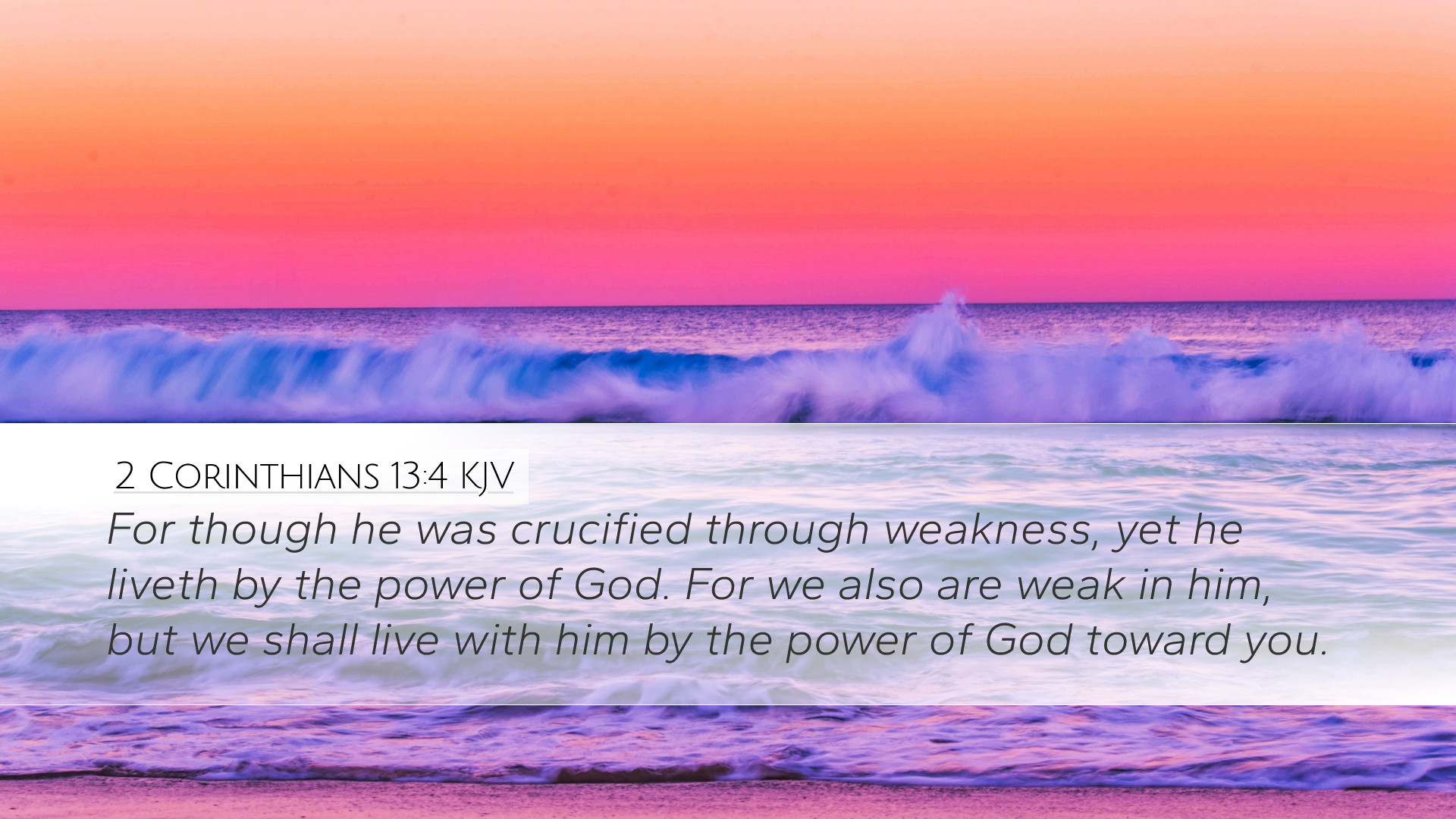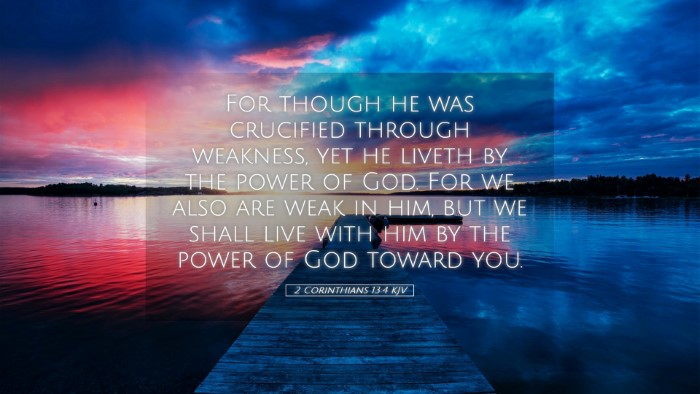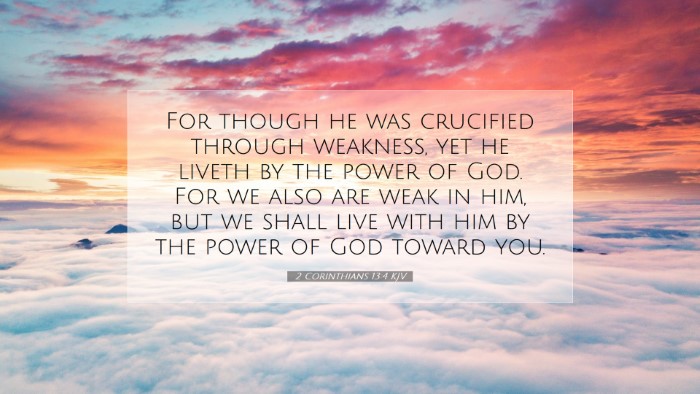Old Testament
Genesis Exodus Leviticus Numbers Deuteronomy Joshua Judges Ruth 1 Samuel 2 Samuel 1 Kings 2 Kings 1 Chronicles 2 Chronicles Ezra Nehemiah Esther Job Psalms Proverbs Ecclesiastes Song of Solomon Isaiah Jeremiah Lamentations Ezekiel Daniel Hosea Joel Amos Obadiah Jonah Micah Nahum Habakkuk Zephaniah Haggai Zechariah Malachi2 Corinthians 13:4
2 Corinthians 13:4 KJV
For though he was crucified through weakness, yet he liveth by the power of God. For we also are weak in him, but we shall live with him by the power of God toward you.
2 Corinthians 13:4 Bible Commentary
Summary of 2 Corinthians 13:4
Verse: “For though he was crucified in weakness, yet he lives by the power of God. For we also are weak in Him, but we shall live with Him by the power of God toward you.”
Contextual Overview
The Apostle Paul, in his second letter to the Corinthians, addresses the nature of strength and weakness in relation to the ministry of Christ. This particular verse highlights the paradox of Christ’s crucifixion—His apparent weakness contrasted with the divine power that sustains life. Through this commentary, we will explore insights from several public domain theologians.
Insights from Commentators
-
Matthew Henry's Perspective
Matthew Henry emphasizes the transformative power of the resurrection. He elucidates the idea that Christ's death, while appearing weak, was a deliberate act that ultimately reveals God's strength. His commentary stresses that in our human fragility, we find strength by being united with Christ in His resurrection. Henry notes that believers share in Christ's power, enabling them to endure their weaknesses.
-
Albert Barnes' Interpretation
Albert Barnes provides an analytical look at the duality of weakness and strength. He explains that the phrase "crucified in weakness" denotes Christ's humiliation and suffering, which was essential for the plan of salvation. Barnes highlights that the phrase "lives by the power of God" serves as a powerful reminder of the resurrection; it affirms that despite seeming vulnerability, the outcome is divine victory and life. He suggests that Paul uses his own weakness to illustrate the assurance of strength through faith.
-
Adam Clarke's Commentary
Adam Clarke discusses the implications of the resurrection concerning both Christ and believers. He remarks on the notion that through Christ's apparent vulnerability comes the greatest demonstration of divine power. Clarke draws parallels between the struggles faced by believers and the sustaining power they receive from God. His analysis indicates that Paul is making a case for relying on God's strength, especially when faced with adversities, reinforcing the goodness of divine intervention in human frailty.
Thematic Analysis
This verse embodies several key theological themes:
-
Weakness and Strength:
The juxtaposition of weakness and divine power serves as a reminder to Christians that true strength comes not from human capability but from reliance on God's power. In our weakness, God’s strength is magnified.
-
Identification with Christ:
Believers are encouraged to identify with Christ’s sufferings and resurrection. By doing so, they can find purpose and strength in their own trials. Paul’s message is that through trials, Christians can experience a profound connection with Christ.
-
The Role of Resurrection:
The resurrection is central to Christian faith, showcasing the ultimate triumph over sin and death. It reassures believers that despite earthly struggles, life in Christ is abundant and powerful.
Practical Application
In light of this passage, the following applications can be made:
-
Embrace Weakness:
Individuals are encouraged to embrace their weaknesses as opportunities for God’s power to be evident in their lives. Acknowledging limitations opens the door to divine assistance.
-
Live in Resurrection Power:
Believers are admonished to live in the resurrection power of Christ, reflecting on how this power sustains their spiritual journey. This is both an encouragement and a call to action for Christians to rise above their difficulties.
-
Fellowship with Christ:
The verse urges believers to maintain a close fellowship with Christ, understanding that their lives are intertwined with His suffering and triumphant power. Continuous closeness with Christ helps them navigate their personal tribulations.
Conclusion
2 Corinthians 13:4 encapsulates a profound theological truth about the nature of Christ’s sacrifice and the transformative power available to believers. Scholars like Henry, Barnes, and Clarke illuminate this text, guiding us to understand that even in our weak moments, we are uplifted by the unmatched power of God. As pastors, students, and theologians reflect on this verse, they are reminded of the duality of human experience and divine intervention—a precious truth that shapes Christian identity and mission.


